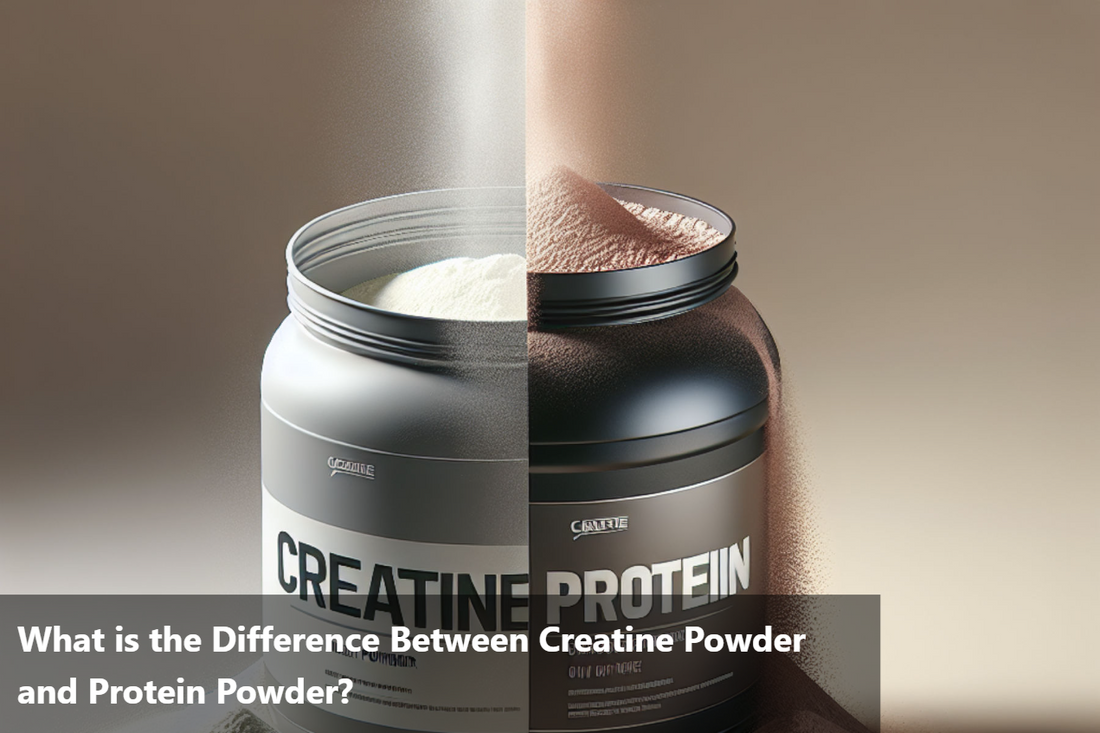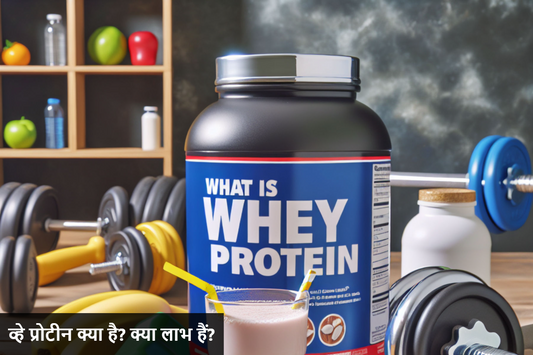Creatine powder and protein powder are two widely popular supplements in the fitness industry. While both play essential roles in enhancing athletic performance and muscle growth, understanding the differences between them is key to maximizing their benefits effectively.
Creatine powder, a powerhouse supplement, is known for its ability to boost energy levels and assist in high-intensity workouts. On the other hand, protein powder is renowned for its muscle-repairing properties and aiding in muscle recovery post-exercise.
The nutritional disparity between creatine powder and protein powder lies in their core components. Creatine powder primarily enhances ATP production, providing a quick burst of energy during workouts. In contrast, protein powder, derived from various sources like whey or soy, supports muscle repair and growth through its amino acid content.
Knowing these distinctions is crucial for tailoring your supplement intake to your fitness goals. By incorporating both creatine and protein powders strategically into your routine, you can optimize your performance and results in a balanced manner.
What is Creatine Powder?
-
Creatine powder is a popular supplement known for its performance-enhancing effects in the fitness world. It is a compound that the body produces naturally and is also found in certain foods like red meat. However, many athletes and bodybuilders opt for creatine powder supplementation due to its ability to increase energy production during high-intensity workouts.
-
The primary purpose of creatine powder is to improve strength, power, and muscle endurance. When consumed, creatine is converted into phosphocreatine in the body, which helps regenerate adenosine triphosphate (ATP), the energy currency of the cells. This process accelerates the replenishment of ATP, allowing muscles to work harder and recover faster during exercise.
-
Athletes and bodybuilders often use creatine powder to enhance their performance, increase muscle mass, and improve overall workout capacity. It is particularly beneficial for activities that require short bursts of intense energy, such as weightlifting or sprinting. The supplement is also known for its ability to draw water into muscle cells, influencing cell hydration and promoting muscle growth.
What is Protein Powder?
-
Protein powder is a popular supplement that serves as a convenient source of protein for individuals aiming to support muscle building and recovery. It is typically derived from various sources such as whey, casein, soy, or plant-based sources like pea, rice, or hemp.
-
In the realm of fitness, protein powder plays a vital role in enhancing muscle growth, repair, and overall recovery post-workout. Consuming an adequate amount of protein is crucial for individuals involved in regular physical activity, as it aids in maintaining and building muscle mass.
-
When comparing protein powder to creatine powder, the key difference lies in their nutritional composition. Protein powder primarily provides amino acids, which are the building blocks of muscle tissue.
The benefits of incorporating protein powder into your fitness routine include supporting muscle repair and growth, aiding in satiety and weight management, and enhancing overall workout performance. It is essential to choose the right supplement based on individual fitness goals and nutritional needs to optimize results. Remember, consulting with a healthcare professional or nutritionist can offer personalized guidance for supplement usage.
Differences Between Creatine Powder and Protein Powder
|
Aspect |
Creatine Powder |
Protein Powder |
|---|---|---|
|
Primary Purpose |
Enhances athletic performance, increases muscle strength and mass, supports high-intensity exercise. |
Supports muscle repair and growth, increases protein intake, aids in weight management. |
|
Main Component |
Creatine monohydrate (or other forms of creatine). |
Protein (whey, casein, soy, pea, etc.). |
|
Macronutrient Content |
Primarily contains creatine, negligible macronutrient content. |
High in protein, varying levels of carbohydrates and fats depending on the product. |
|
Calories |
Very low calorie, typically 0-15 calories per serving. |
Varies; typically 100-150 calories per serving depending on the protein source and added ingredients. |
|
None or negligible. |
High; typically 20-30 grams per serving. |
|
|
Carbohydrate Content |
None or negligible. |
Varies; from 1-15 grams per serving depending on the product. |
|
Fat Content |
None or negligible. |
Varies; usually 1-5 grams per serving. |
|
Typical Serving Size |
3-5 grams. |
20-30 grams. |
|
Key Benefits |
Increases ATP production, enhances strength and power, supports muscle hydration and recovery. |
Provides essential amino acids, supports muscle protein synthesis, aids in satiety and weight management. |
|
Usage Timing |
Often taken before or after workouts. |
Can be taken any time of day; commonly used pre- or post-workout, or as meal replacements/snacks. |
|
Suitable For |
Athletes, bodybuilders, anyone looking to enhance short-term high-intensity performance. |
Athletes, bodybuilders, those needing additional protein intake, anyone aiming for muscle repair and growth. |
|
Common Forms |
Creatine monohydrate, creatine ethyl ester, creatine hydrochloride. |
Whey protein, casein protein, soy protein, pea protein, hemp protein, etc. |
|
Additional Nutrients |
May include small amounts of sodium or other additives, but generally few additional nutrients. |
Often fortified with vitamins, minerals, and digestive enzymes. |
|
Potential Side Effects |
Gastrointestinal issues, dehydration if not enough water is consumed. |
Gastrointestinal issues, potential allergies (especially with whey or soy), overconsumption can lead to excess calorie intake. |
|
Cost |
Generally lower cost per serving compared to protein powder. |
Varies widely based on type and brand; generally higher cost per serving than creatine. |
Benefits of Creatine Powder and Protein Powder
Creatine Powder:
-
Boosts Strength and Power Output: Known for its ability to increase the body's production of ATP.
-
Supports Intense Workouts: Aids in more intense and explosive workouts.
-
Ideal for High-Intensity Activities: Particularly beneficial for weightlifting, sprinting, and other high-intensity activities.
Protein Powder:
-
Muscle Repair and Growth: Plays a vital role in rebuilding and strengthening muscles after exercise.
-
Provides Essential Amino Acids: Necessary for muscle recovery and increasing muscle mass.
-
Supports Recovery from Intense Training: Helps in recovering from intense training sessions effectively.
Strategic Incorporation:
-
Maximize Benefits: Incorporate both creatine and protein powders strategically to maximize the benefits of your fitness routine.
-
Performance Enhancement: Use creatine to enhance performance during workouts.
-
Muscle Recovery and Growth: Use protein powder to support muscle recovery and growth post-exercise.
Balanced Approach:
-
Power and Repair: Ensure that your body receives the necessary support for both power and repair.
-
Improved Athletic Performance: This balanced approach leads to overall improved athletic performance.
Bottomline
When it comes to choosing between creatine and protein powder, it's essential to align your decision with your unique fitness aspirations. If your goal is to enhance power and strength, creatine powder might be the ideal choice. Conversely, if muscle growth and recovery are your priorities, protein powder can be the supplement for you.
To make an informed decision, consider consulting with a healthcare professional or nutritionist. Their expertise can provide personalized insights based on your specific needs and goals. Remember, the key to a successful fitness regimen lies in understanding the benefits and differences between these supplements, allowing you to tailor your supplement intake to optimize your performance and results.
This Blog post is an initiative by DiabeSmart, to provide accurate and Nutritionist / Doctor approved information related to Diabetes. DiabeSmart is India's first Food brand designed specifically for Diabetics, that has been clinically tested on Diabetics and Pre-Diabetics to deliver 55% - 70% lower Sugar spikes. DiabeSmart is part of Lo! Foods - India's leading brand for Everyday Functional Health foods.















